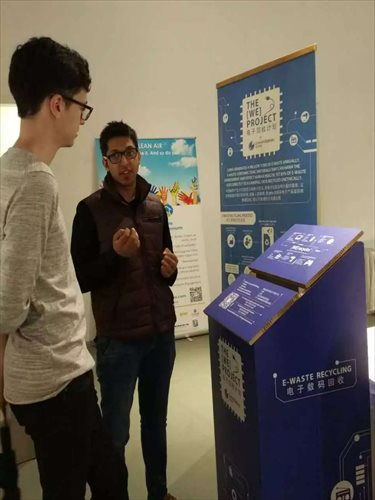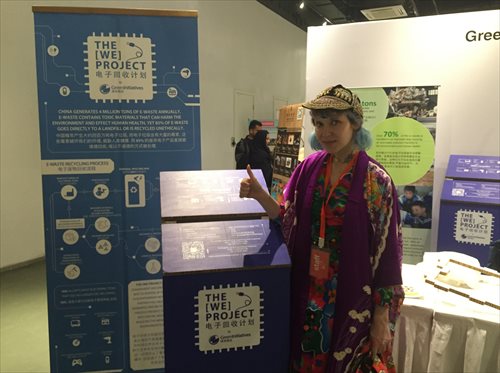HOME >> METRO SHANGHAI
Shanghai-based environmental group pioneers electronics recycling project
By Wang Han Source:Global Times Published: 2016/6/12 18:18:01
E-waste generally refers to discarded electronic devices such as computers and mobile phones, as well as home appliances like refrigerators, air conditioners, television sets and hair dryers. According to Nitin Dani, director of Green Initiatives, a Shanghai-based nonprofit environmental organization, over 4 million tons of such electronic waste is produced in China every year, but only 15 percent gets recycled.
To handle the growing amount of electronic garbage in China, Green Initiatives is targeting the local community to carry out a groundbreaking e-waste recycling program, called WE Project.
In collaboration with Netspring, a social enterprise focused on environmental protection and IT education, the pioneering project aims to provide a transparent, systematic and environmentally friendly channel for local residents and companies to deal with unwanted and broken electronic devices.
Individuals can now drop off unwanted electronic products at one of WE Project's many collection boxes around the city. The locations of these collection boxes will be posted on Green Initiatives' home page. Companies, schools and organizations can order a collection box branded with their own logo and organize pickups on a regular basis through Green Initiatives.
Some dangerous electronic devices cannot be recycled through collection boxes, such as batteries, light bulbs, laboratory or medical equipment, or devices larger than 30x30 cm. The project emphasizes its participants' data confidentiality and security. "For every individual that joins our program, we sign a confidential agreement with them to ensure none of their information will be leaked," said Dani.
Taking responsibility
In terms of the ecological and societal benefits the project is expected to bring about in China, Dani said their priority is to decrease pollution.
"Once we start to dispose e-waste the right way, then there will be fewer chemicals in Chinese landfills, its soil, its water and its air. This will improve our natural environment," he said. "It is hard for people to see that at first, because it is a long process, but we want to set the process in place."
He added that he and his team hope to raise China's public awareness in e-waste recycling and reduction. "Except for children, no one is innocent. We all blame the government, blame companies and blame people around us. But a lot of blame falls within us. I hope this project can enable local people to take responsibility," he said.
Though the project has already been launched, Dani said they still need one more month to get it "on track," as they are currently coping with challenges in finding sponsorships and putting collection boxes in public locations.
"For any kind of project, the most important part is to have necessary funds to run it, because everything we are doing requires a lot of time, money and people," said Dani. "The super-basic minimum cost is the price of making collection boxes, transporting them and organizing pickups. In addition we have to pay people, marketing, management, etc."
Transparency & trust
Dani and his partners have been cautious about choosing a local recycling company to work with. He pointed out the most crucial part of their project is to provide the community with a trustworthy and reliable recycling option.
"If people think their e-waste is not being treated properly, then they won't trust the program," said Dani. "So for us, we have to know what the recycling company does with the waste. We need answers for the communities when they ask us what happens to the waste."
Dani explained that they have been planning this e-waste project for three years, nearly launching it two years ago, however the Chinese recycling company they intended to cooperate with had financial difficulties. Currently, they work with TES-AMM, a Singapore-based company recognized for its electronic waste recycling.
Dani said he and his team have paid a visit to one of TES-AMM's factories in Shanghai and were impressed by the company's professionalism.
"We saw a huge warehouse filled with televisions, refrigerators, microwaves and computers. Tons and tons of electronic waste," he said. "Only after we saw how the whole process is completed did we finally decide to cooperate with that company."
Dani pointed out that recycling e-waste is expensive and requires proper technology and knowledge. Unprofessional or unethical methods of dealing with e-waste tends to bring harmful, counterproductive effects to environments.
He noticed, for example, that some Chinese individuals privately collect discarded electronic devices from communities and companies in order to extract precious metals for money. But those people wind up burning leftover plastics and materials, which is extremely toxic and releases much more harmful fumes back into the environment.
Global problem
The consumption of electronic gadgets and home appliances has been rising rapidly worldwide in recent years, which has generated an astronomical amount of electronic garbage.
A recent study conducted by the United Nations University revealed that approximately 42 million tons of electronic waste was produced globally in 2014. China generated the second-largest amount of e-waste, creating over 6 million tons of electronic garbage in 2014 alone.
Dani told the Global Times that e-waste is a global problem, but is a particularly serious issue in China. "China is a huge country with many people. Many electronics sold throughout the world are produced in China. So it is not only e-waste from the consumer side, but also the supplier's side," he said.
He explained that in countries with less people and less consumption, e-waste is not seen as a serious issue. But in China, where 1.3 billion people now have mobile phones or other digital devises, the amount of electronic garbage is "unimaginable."
Dani suggested that China could learn from recycling initiatives being enacted in certain developed nations.
"In some Europe countries, for instance, consumers can return their old appliances back to the same brand (to handle the recycling). This practice is good, because if the brand is producing the appliances, they should also take the responsibility of cleaning the waste when it's not being used anymore."


Newspaper headline: Tackling e-waste
To handle the growing amount of electronic garbage in China, Green Initiatives is targeting the local community to carry out a groundbreaking e-waste recycling program, called WE Project.
In collaboration with Netspring, a social enterprise focused on environmental protection and IT education, the pioneering project aims to provide a transparent, systematic and environmentally friendly channel for local residents and companies to deal with unwanted and broken electronic devices.
Individuals can now drop off unwanted electronic products at one of WE Project's many collection boxes around the city. The locations of these collection boxes will be posted on Green Initiatives' home page. Companies, schools and organizations can order a collection box branded with their own logo and organize pickups on a regular basis through Green Initiatives.
Some dangerous electronic devices cannot be recycled through collection boxes, such as batteries, light bulbs, laboratory or medical equipment, or devices larger than 30x30 cm. The project emphasizes its participants' data confidentiality and security. "For every individual that joins our program, we sign a confidential agreement with them to ensure none of their information will be leaked," said Dani.
Taking responsibility
In terms of the ecological and societal benefits the project is expected to bring about in China, Dani said their priority is to decrease pollution.
"Once we start to dispose e-waste the right way, then there will be fewer chemicals in Chinese landfills, its soil, its water and its air. This will improve our natural environment," he said. "It is hard for people to see that at first, because it is a long process, but we want to set the process in place."
He added that he and his team hope to raise China's public awareness in e-waste recycling and reduction. "Except for children, no one is innocent. We all blame the government, blame companies and blame people around us. But a lot of blame falls within us. I hope this project can enable local people to take responsibility," he said.
Though the project has already been launched, Dani said they still need one more month to get it "on track," as they are currently coping with challenges in finding sponsorships and putting collection boxes in public locations.
"For any kind of project, the most important part is to have necessary funds to run it, because everything we are doing requires a lot of time, money and people," said Dani. "The super-basic minimum cost is the price of making collection boxes, transporting them and organizing pickups. In addition we have to pay people, marketing, management, etc."
Transparency & trust
Dani and his partners have been cautious about choosing a local recycling company to work with. He pointed out the most crucial part of their project is to provide the community with a trustworthy and reliable recycling option.
"If people think their e-waste is not being treated properly, then they won't trust the program," said Dani. "So for us, we have to know what the recycling company does with the waste. We need answers for the communities when they ask us what happens to the waste."
Dani explained that they have been planning this e-waste project for three years, nearly launching it two years ago, however the Chinese recycling company they intended to cooperate with had financial difficulties. Currently, they work with TES-AMM, a Singapore-based company recognized for its electronic waste recycling.
Dani said he and his team have paid a visit to one of TES-AMM's factories in Shanghai and were impressed by the company's professionalism.
"We saw a huge warehouse filled with televisions, refrigerators, microwaves and computers. Tons and tons of electronic waste," he said. "Only after we saw how the whole process is completed did we finally decide to cooperate with that company."
Dani pointed out that recycling e-waste is expensive and requires proper technology and knowledge. Unprofessional or unethical methods of dealing with e-waste tends to bring harmful, counterproductive effects to environments.
He noticed, for example, that some Chinese individuals privately collect discarded electronic devices from communities and companies in order to extract precious metals for money. But those people wind up burning leftover plastics and materials, which is extremely toxic and releases much more harmful fumes back into the environment.
Global problem
The consumption of electronic gadgets and home appliances has been rising rapidly worldwide in recent years, which has generated an astronomical amount of electronic garbage.
A recent study conducted by the United Nations University revealed that approximately 42 million tons of electronic waste was produced globally in 2014. China generated the second-largest amount of e-waste, creating over 6 million tons of electronic garbage in 2014 alone.
Dani told the Global Times that e-waste is a global problem, but is a particularly serious issue in China. "China is a huge country with many people. Many electronics sold throughout the world are produced in China. So it is not only e-waste from the consumer side, but also the supplier's side," he said.
He explained that in countries with less people and less consumption, e-waste is not seen as a serious issue. But in China, where 1.3 billion people now have mobile phones or other digital devises, the amount of electronic garbage is "unimaginable."
Dani suggested that China could learn from recycling initiatives being enacted in certain developed nations.
"In some Europe countries, for instance, consumers can return their old appliances back to the same brand (to handle the recycling). This practice is good, because if the brand is producing the appliances, they should also take the responsibility of cleaning the waste when it's not being used anymore."

Director of Green Initiatives Nitin Dani (right) introduces their e-waste recycling program to a visitor.

An individual shows interest in the program. Photos: Wang Han/GT
Newspaper headline: Tackling e-waste
Posted in: Metro Shanghai